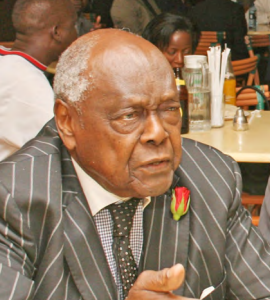

Onyango Otieno would have been
a judge way earlier than 1998 when
he eventually got to sit in the High
Court bench, were it not Charles
Njonjo (now deceased) rejecting
his promotion.
Njonjo was the Attorney General. The retired Court of Appeal judge says Njonjo vetoed the decision of the Judicial Service Commission in early 1970s to elevate him in the ranks as a judicial officer.
Justice Otieno started his career in law when he was appointed the deputy registrar of the High Court in 1969. He at the same time served as a resident magistrate.
He writes in his autobiography From Village to Village that the job entailed administration of the courts under the supervision of the registrar.
Otieno also administered the court and did taxation, approving decrees and orders. As a magistrate, he would also hear civil and criminal matters.
But after sometime, then Chief Justice James Wicks offered to promote him to senior resident and move him to Kisii. He did not get the promotion.
“Chief Justice called me and asked whether I would mind being promoted to the position of senior resident magistrate, the highest cadre of magistracy at the time,” he writes.
“He also asked if I would mind being posted to Kisii. I told him that I would not mind and thanked him for the consideration. He then told me he would place my name before the Judicial Service Commission, which would confirm his suggestion. He therefore asked me to prepare for the same.”
This was in 1971. Otieno says he informed his wife who was then working in Nairobi as a secretary with Hogg Robinson and company.
“Since this offer had been made by the Chief Justice, who was the chairman of the commission, I had no doubt in my mind that it would materialise.”
In November 1971, he writes, a member of the commission called him and to his surprise, he was told that his promotion had been denied.
“One member, Charles Njonjo, the Attorney General, had vetoed the suggestion. He felt that I was too young for that post and that I needed to stay in my post for at least another six months before I could be promoted,” he writes.
Otieno says he read malice in this. However, I held my peace before I could get a formal response from the chief justice, he says.
The CJ eventually called him and they talked for over two hours, relaying the same decision of the commission and blaming Njonjo for it.
“My response was that as he was the chairman of the commission and as he had told me that I would be promoted, he had to stand by his word,” Otieno says.
“At the end of the meeting, I was not convinced, and I did not see any future in my service in the Judiciary.”
Njonjo was so powerful when Jomo Kenyatta was president that he would countermand the decision of the CJ who was the chairman of the commission.
It was this blocking of his rise by Njonjo that made him quit and start private practice of criminal law, rising to be a household name in the 1980s.
Otieno quit private practice in
1998 and joined the High Court.
He was elevated to the Court of
Appeal in 2003 and retired 11 years
later in 2014 after he attained the
age of 74.











